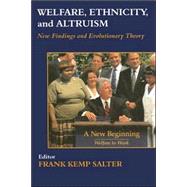- ISBN: 9780714654270 | 0714654272
- Cover: Hardcover
- Copyright: 7/21/2004
Welfare, Ethnicity, and Altruism applies the controversial theory of 'Ethnic Nepotism', first formulated by Irenaus Eibl-Eibesfeldt and Pierre van den Berghe, to the modern welfare state (both are authors in this volume). This theory states that ethnic groups resemble large families whose members are prone to cooperate due to 'kin altruism'. Recent empirical findings in economics and political science offer confirmatory evidence. The book presents two separate studies that compare welfare expenditures around the world, both indicating that the more ethnically mixed a population becomes, the greater is its resistance to redistributive policies. A study of donations to the United Way of America charity finds that White Americans give less when their communities are more than 10 per cent non-White. Still another study, based on observations of giving to street beggars in Moscow, finds an ethnic-nepotistic effect. In a fascinating twist, cohesive regional ethnic groups such as the francophones of Quebec cansometimes leverage additional welfare from the central government. On a related theme, a global survey finds that the most generous foreign aid comes from the most homogeneous countries, and that ethnic diversity hinders economic growth in all except a small number of wealthy societies. These results point to profound inconsistencies within ideologies of both left and right regarding ethnicity. The final chapters consider policy implications. At a time of economic globalisation and mass migration, can generous and inclusive welfare be saved? Solutions and alternatives are discussed, ranging widely across: multiculturalism at state and international levels; assimilation; secession; ethnic federalism; the Swiss model; the European model; affirmative action (group rights); and strict individualist welfare. This book brings together a distinguished group of scholars: evolutionary biologists; political scientists; sociologists; anthropologists; economists; primatologists; and humanethologists, contributors examine how ethnic diversity can affect the level of welfare and cross-ethnic charitableness at both national and cross-national levels, in industrial and tribal societies. A study of meat-sharing in chimpanzees provides a cross-species comparison. This book breaks new ground in advancing our understanding of multicultural politics, ethnic competition and conflict.







